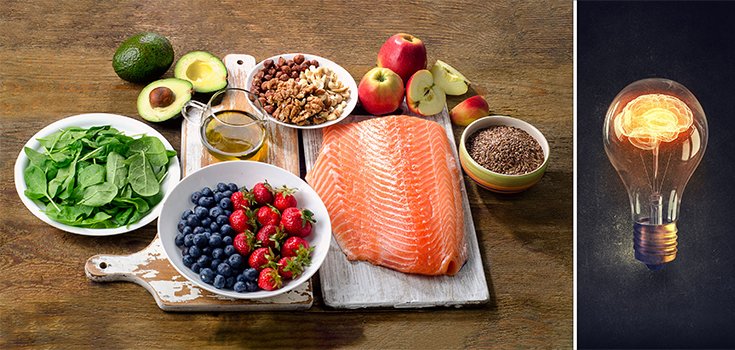Mediterranean Diet Could Protect Your Brain As You Age

Adopting a Mediterranean-style diet may help protect your brain as you age, numerous studies show. [1]
At least 2 studies concluded that people’s risk for dementia declined when they ate the Mediterranean-DASH Intervention for Neurogenerative Delay (MIND) diet. Think of it as sort of a hybrid of the original Mediterranean diet and the DASH (Dietary Approaches to Stop Hypertension) diets, both of which were designed to improve heart health.
The DASH diet consists of foods that are low in saturated fat, total fat, and cholesterol, and is intended to lower blood pressure. It is rich in fruits, vegetables, low-fat dairy, whole grains, poultry, fish, and nuts. It’s quite similar to the Mediterranean diet, but the Mediterranean diet is a bit more specific, in that butter is replaced with olive oil and other healthful fats, and herbs are substituted for salt.

In one of those studies, seniors who strictly followed the MIND diet were found to have a 35% reduced risk of age-related decline in brain function. Even those who followed the diet loosely reduced their risk of brain decline between 18-24%. Those who closely followed the diet were also 35% less likely to perform poorly on tests of brain function.
Dean Hartley, director of science initiatives for the Alzheimer’s Association, said:
“We’ve always been saying that a healthy heart is a healthy brain. Your brain uses 20% of your cardiac output for getting oxygen and glucose. If you don’t have a good pump, that saps the brain of a lot of things needed to sustain its normal function.”
Adhering to a heart-healthy diet also helps protect blood vessels inside the brain, thereby reducing the risk of mini-strokes and other health problems.
Read: 7 Natural Brain Foods for Cognition and Concentration
The second study used data from the U.S.-based Women’s Health Initiative Memory Study, which involved about 7,000 women over the course of 10 years. That research revealed that women who closely followed the MIND diet were 34% less likely to develop Alzheimer’s disease compared to the women who didn’t follow the diet at all.
However, like the first study, following the MIND diet even part of the time still provided much-needed health perks. Women who moderately followed the eating pattern were between 21-24% less likely to develop Alzheimer’s, the researchers found.
Even More Evidence

An additional 2 studies presented at the Alzheimer’s Association meeting revealed the following:
- In a Swedish study of more than 2,000 participants, those who ate a healthy diet called the ‘Nordic Prudent Dietary Pattern’ for 6 years had better brain health. People who follow the Nordic diet limit their consumption of root vegetables, refined grains, butter and margarine, as well as sugary foods and fruit juice.
- Researchers from Columbia University found that people who consumed a diet that encourages inflammation had a difficult time playing brain games. A smaller total volume of gray matter was observed in MRI scans of those participants’ brains. What is an inflammatory diet? High intake of cholesterol, sugar, vegetable oil, fried foods, saturated fats, and more.
It’s important to note that all of the studies were observational, so they can’t prove cause-and-effect. In order to do that, scientifically controlled experiments are necessary. [2]
Read: 5 Things You Should be Eating to Protect Your Brain as It Ages
A lead study author Claire McEvoy, of the University of California, San Francisco’s School of Medicine, said:
“I think the studies, taken together, suggest a role for high quality dietary patterns in brain health and for protection against cognitive decline during aging. Diet is modifiable, and in light of these studies we need clinical trials to test whether changing diet can improve or maintain cognition.”
Keith Fargo, Alzheimer’s Association Director of Scientific Programs and Outreach, was encouraged by the size and depth of the research. He said:
“Although the idea that a healthy diet can help protect against cognitive decline as we age is not new, the size and length of these 4 studies demonstrate how powerful good dietary practices may be in maintaining brain health and function.”
Sources:
[1] Health Day
[2] CNN
